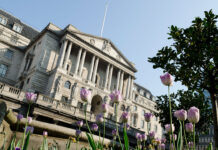UK inflation hit another 40-year high in June with a rise to 9.4% as crushing fuel and food prices pushed the cost of living higher, according to the latest figures from the Office of National Statistics (ONS).
“Rising food and fuel costs have kept inflation red hot this month. This is intensifying the pressure on already stretched pockets and making it increasingly challenging for many households to afford the essentials,” said Wesleyan director of investments Martin Lawrence.
Non-alcoholic drinks and food saw a 9.8% surge in prices over the last year, climbing from 8.7% in May as milk, cheese and eggs acted as the largest contributors to inflation, along with upward effects from vegetables, meat and other food products.
“Everyone will have felt inflation in their food shop, with this month’s figures laying bare just how pricey everything has become. They put grocery inflation at almost 10%, meaning that a £100 food shop a year ago will now set you back £110 for the same items,” said AJ Bell head of personal finance Laura Suter.
“The largest culprits for food inflation will have many people turning vegan, with eggs, cheese, milk and meat all seeing the biggest rises in prices. However, vegetables also saw some substantial price rises, meaning there is nowhere to hide.”
Meanwhile, record petrol prices drove transport inflation higher with a 42.3% rise in motor fuels year-on-year, marking the highest rate since before the constructed series of records began in 1989.
The average price of petrol hit 184p per litre in June against 129.7p last year, representing the highest price since records began in 1990.
Diesel also reached a new record price rise of 12.7p per litre compared to 2.4p the year before.
“Filling up your car is now an eye-watering experience. Between May and June we saw the largest increase in the price of petrol on record, with the price per litre jumping 18.1p,” said Suter.
“It means that in the space of just one month it became £9 more expensive to fill up an average family car.”
Clothing and footwear saw a slight fall in inflation, with an increase of 6.1% in the year from 6.9% in May.
Bank of England to take stronger action
The Bank of England commented it would be at least two years before inflation returned to its target of 2%, with inflation currently expected to hit 11% in October this year and the cost of living crisis set to intensify as household finances struggle.
“Amid rising inflation, the amount of spare cash people have left over at the end of each month is likely shrinking at some rate,” said abrdn client director Colin Dyer.
“With the Bank of England expecting it to be two years or more before inflation returns to the Government’s 2% target, the nation’s finances could be strained for the sometime.”
The Bank of England set its last rate hike to 1.25%, however with inflation hitting record highs each month, the institution looks increasingly likely to raise interest rates by 0.5% at its next meeting after Governor Andrew Bailey signalled stronger action.
“It could … be the signal for the Bank of England to hike rates by 0.5% next month, less than 24 hours after the Governor, Andrew Bailey, said he was prepared to take stronger action,” said Suter.





